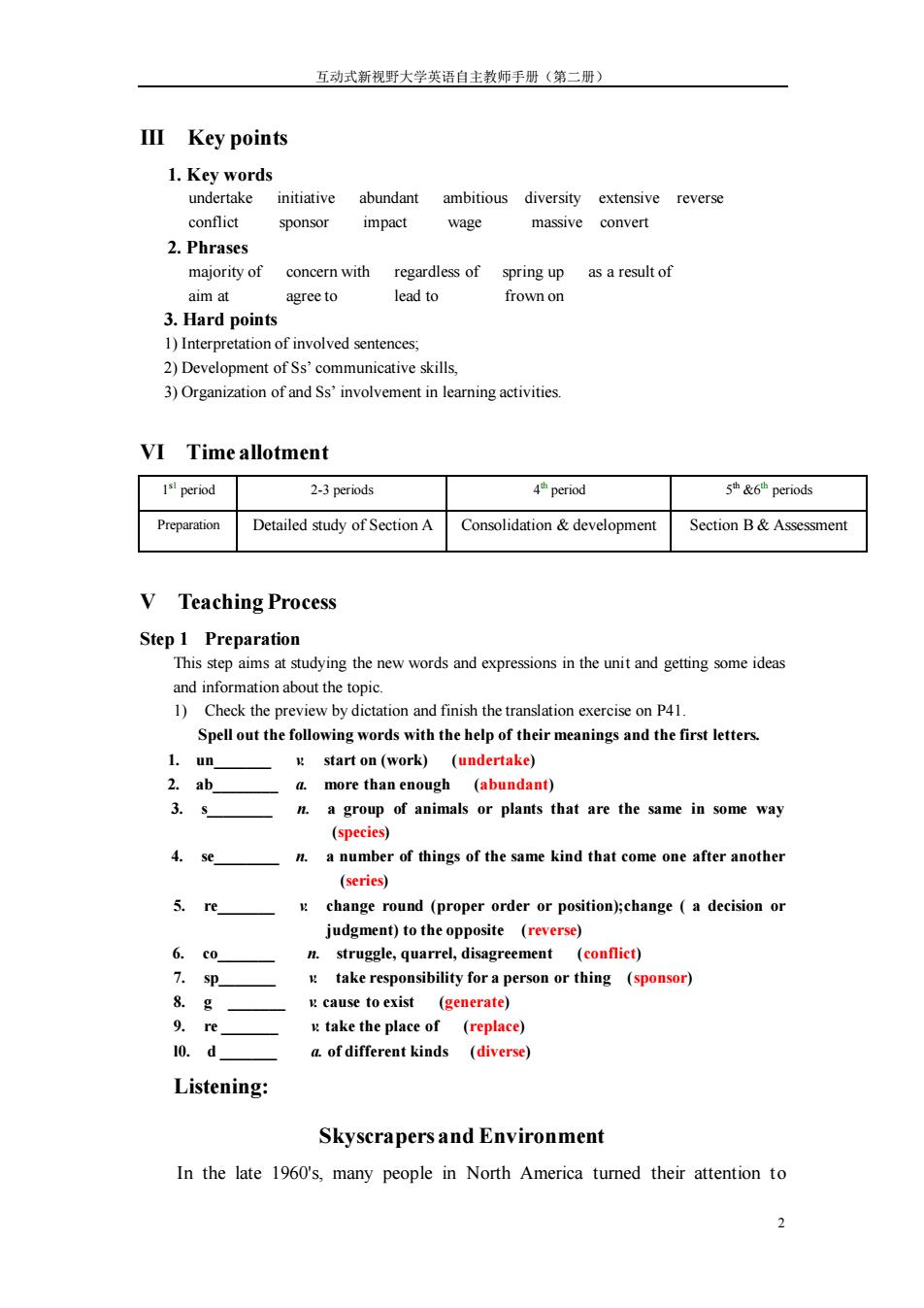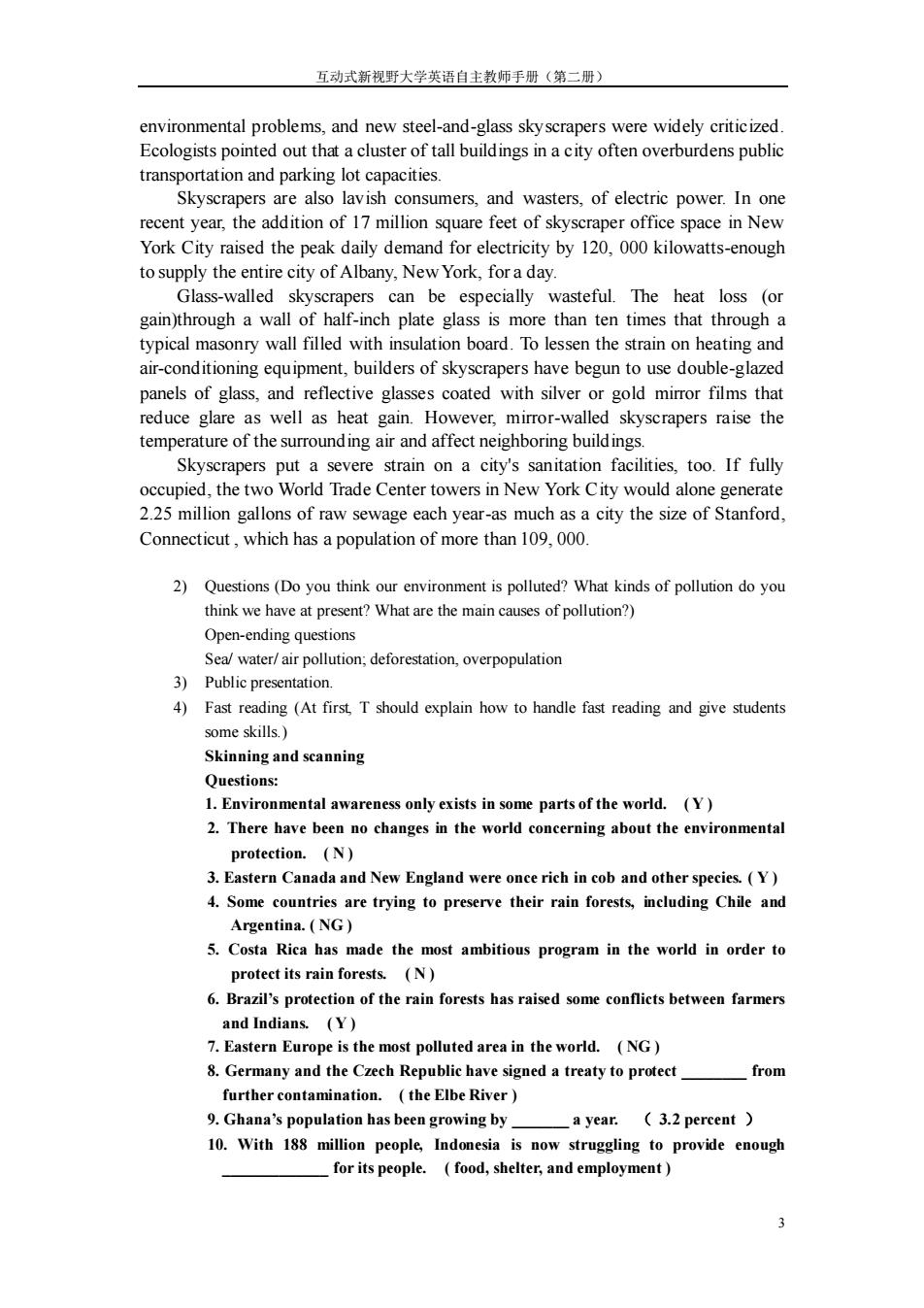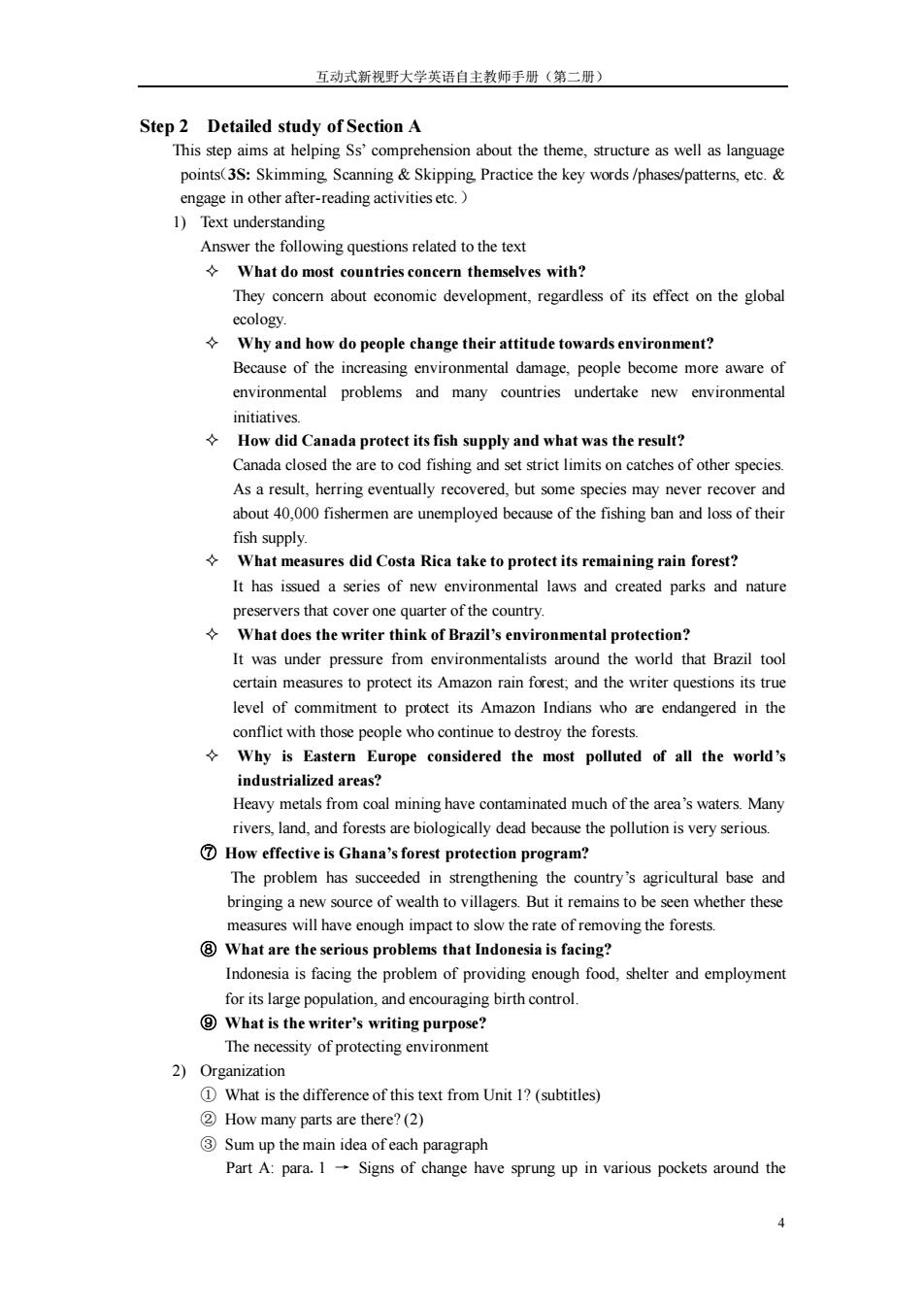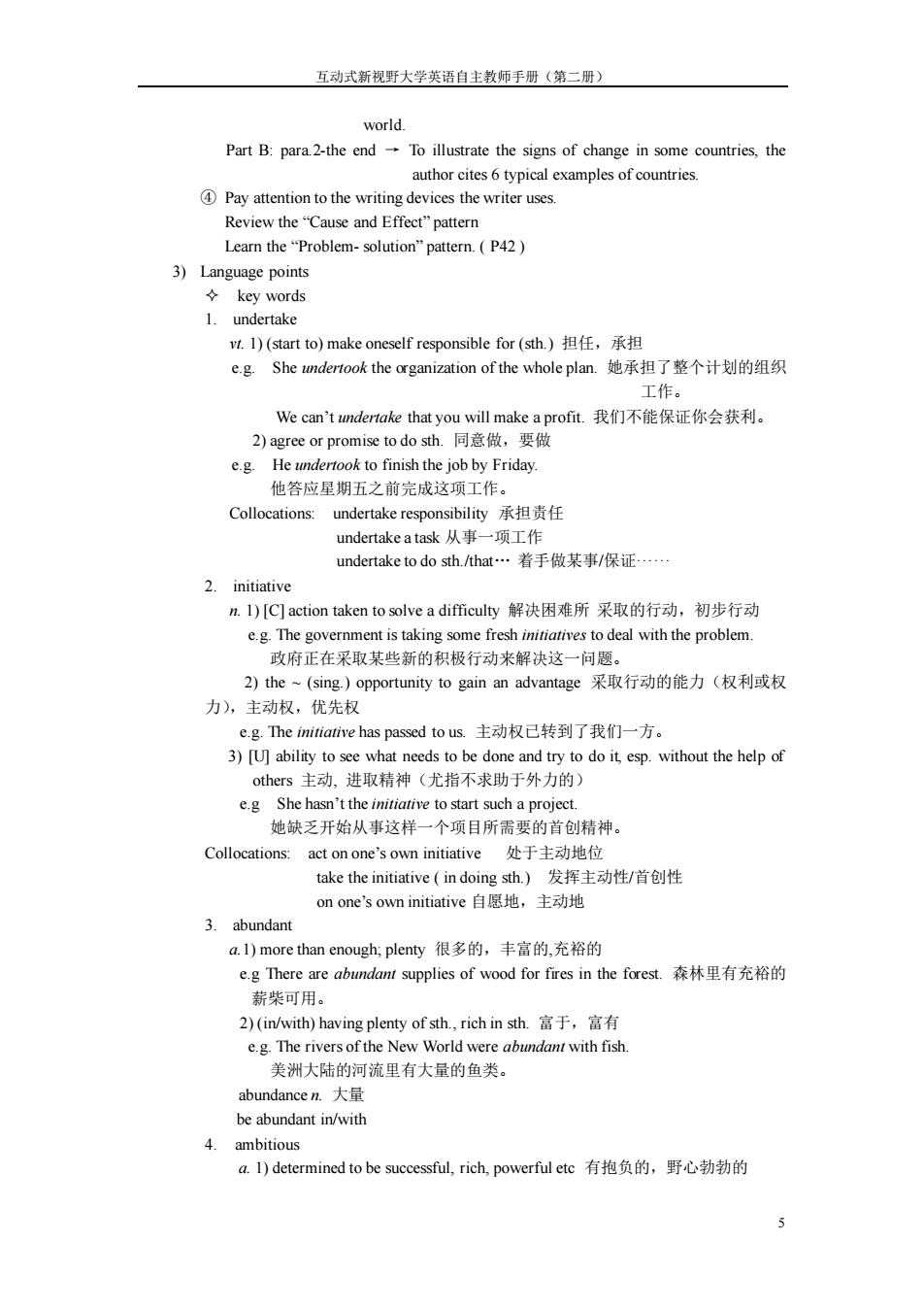
互动式新视野大学英语自主教师手册(第二册) Unit2BookⅡNHCE 学院_07教改_到 I.Teaching Material Environmental Protection Throughout the World Section B Green Spaces in Cities II.Objectives Objectives Statements of Intended Learning Outcomes KI Grasp the main idea and the organization of the text. 知识目标 K2 Comprehend involved sentences or /sentence patterns, (To Know) K3 Master the key language points and grammatical structures in the text: (课堂后·学生应 K4 Develop awareness of environmental issues, 能理解到什么知K5 Learn to write a paragraph with problem-solution pattern. 识 DI Improve reading by distinguishing between facts and opinions(Sectio 技能目标 B): (To Do) D2 Improve writing skills(Writing task of SectionA). (课堂后·学生获D3 Receive the skills&rules of finding out word meanings(Section B): 得以下技能) D4 Develop critical thinking Learn appro hes to communication, D6 Form the habit of self-reflecting on and independently analyzing and tacking problems in ELL: D7 Develop team work and co-operation via group activities D8 Developautonomous earning ability viaon-n and off-ine study D9Cultivate research kil by exporing the unkwn related to th theme In terms of learning itself.For example: 情意目标 BI Develop Ss'interests/confidence in environmental issues through (To Be) autonomous learning and co-operation via on-line and off-line learning B2 Enable Sstoenjoy their accomplishments in collecting related informatio 个人及社会价 and public presentation /态度(Be)或 In terms of developing morals,values and ethics,it depends on the topi 做到什么样的 concerned. 人9 BI Be more concerned with the social issue and be fully aware of the importance of environmental protection. B2 Enhance Ss'social-consciousr B3 Cherish the school-time toqualify onesef B4 Develop the ability to view issues from different aspects and the habit to solve problems/collect information on one's own. 1
互动式新视野大学英语自主教师手册(第二册) 1 Unit 2 Book II NHCE _学院 _07_教改 _班 I. Teaching Material Section A Environmental Protection Throughout the World Section B Green Spaces in Cities II. Objectives Objectives Statements of Intended Learning Outcomes 知识目标 (To Know) (课堂后·学生应 能理解到什么知 识? ) K1 Grasp the main idea and the organization of the text; K2 Comprehend involved sentences or /sentence patterns; K3 Master the key language points and grammatical structures in the text; K4 Develop awareness of environmental issues; K5 Learn to write a paragraph with problem-solution pattern. 技能目标 (To Do) (课堂后·学生获 得以下技能 ) D1 Improve reading by distinguishing between facts and opinions (Section B); D2 Improve writing skills (Writing task of Section A); D3 Receive the skills & rules of finding out word meanings (Section B); D4 Develop critical thinking; D5 Learn approaches to communication; D6 Form the habit of self-reflecting on and independently analyzing and tacking problems in ELL; D7 Develop team work and co-operation via group activities; D8 Develop autonomous learning ability via on-line and off-line study; D9 Cultivate research skills by exploring the unknown related to the theme. 情意目标 (To Be) (个人及社会价值 /态度 (Be) 或 做 到 什 么 样 的 人?) In terms of learning itself. For example: B1 Develop Ss’ interests/ confidence in environmental issues through autonomous learning and co-operation via on-line and off-line learning B2 Enable Ss to enjoy their accomplishments in collecting related information and public presentation. In terms of developing morals, values and ethics, it depends on the topic concerned. B1 Be more concerned with the social issue and be fully aware of the importance of environmental protection. B2 Enhance Ss’social-consciousness and social responsibility. B3 Cherish the school-time to qualify oneself. B4 Develop the ability to view issues from different aspects and the habit to solve problems / collect information on one’s own

互动式新视野大学英语自主教师手册(第二册) III Key points 1.Key words undertake initiative abundant ambitious diversity extensive reverse conflict sponsor impact wage massive convert 2.Phrases majority of concern with regardless of spring up as a result of aim at agree to lead to frown on 3.Hard points 1)Interpretation of involved sentences; 2)Development of Ss'communicative skills, 3)Organization ofand Ssinvolvement in learning activities VI Timeallotment period 2-3 periods 4 period 5periods Preparation Detailed study of SectionA Consolidation&development Section B&Assessment V Teaching Process Step 1 Preparation This step aims at studying the new words and expressions in the unit and getting some ideas and information about the topic. 1)Check the preview by dictation and finish the translation exercise on P41. Spell out the following words with the help of their meanings and the first letters. 1. u start on(work)(undertake) 2.ab a.more than enough (abundant) 3.s n.a group of animals or plants that are the same in some way (species) 4.se n.a number of things of the same kind that come one after another (series) 5.re change round(proper order or position);change (a decision or judgment)to the opposite (reverse) 6.c0 n.struggle,quarrel,disagreement (conflict) 7.sp take responsibility for a person or thing (sponsor) 8. v cause to exist (generate) take the place of (replace) 10.d a.of different kinds (diverse) Listening: Skyscrapers and Environment In the late 1960's,many people in North America turned their attention to 2
互动式新视野大学英语自主教师手册(第二册) 2 III Key points 1. Key words undertake initiative abundant ambitious diversity extensive reverse conflict sponsor impact wage massive convert 2. Phrases majority of concern with regardless of spring up as a result of aim at agree to lead to frown on 3. Hard points 1) Interpretation of involved sentences; 2) Development of Ss’ communicative skills, 3) Organization of and Ss’ involvement in learning activities. VI Time allotment 1 s1 period 2-3 periods 4 th period 5 th &6th periods Preparation Detailed study of Section A Consolidation & development Section B & Assessment V Teaching Process Step 1 Preparation This step aims at studying the new words and expressions in the unit and getting some ideas and information about the topic. 1) Check the preview by dictation and finish the translation exercise on P41. Spell out the following words with the help of their meanings and the first letters. 1. un_ v. start on (work) (undertake) 2. ab_ a. more than enough (abundant) 3. s_ n. a group of animals or plants that are the same in some way (species) 4. se_ n. a number of things of the same kind that come one after another (series) 5. re_ v. change round (proper order or position);change ( a decision or judgment) to the opposite (reverse) 6. co_ n. struggle, quarrel, disagreement (conflict) 7. sp_ v. take responsibility for a person or thing (sponsor) 8. g _ v. cause to exist (generate) 9. re _ v. take the place of (replace) l0. d _ a. of different kinds (diverse) Listening: Skyscrapers and Environment In the late 1960's, many people in North America turned their attention to

互动式新视野大学英语自主教师手册(第二册) environmental problems,and new steel-and-glass skyscrapers were widely criticized. Ecologists pointed out that a cluster of tall buildings in acity often overburdens public transportation and parking lot capacities Skyscrapers are also lavish consumers,and wasters,of electric power.In one recent year,the addition of 17 million square feet of skyscraper office space in New York City raised the peak daily demand for electricity by 120,000 kilowatts-enough tosupply the ntre ity of Albany,New York.for a day Glas walled skyscrapers be especially wasteful.The heat loss (0 gain)through a wall of half-inch plate glass is more than ten times that through a typical masonry wall filled with insulation board.To lessen the strain on heating and air-conditioning equipment,builders of skyscrapers have begun to use double-glazed panels of glass,and reflective glasses coated with silver or gold miror films that reduce glare well as heat gain.However,mirror-walled skyscrapers raise the temperature of the surrounding air and affect neighboring buildings. Skyscrapers put a severe strain on a city's sanitation facilities,too.If fully occupied,the two World Trade Center towers in New York City would alone generate 2.25 million gallons of raw sewage each year-as much as a city the size of Stanford, Connecticut which has a population of more than 109,000 2)Questions(Do you think our environment is polluted?What kinds of pollution do you think we have at present?What are the main causes of pollution?) Open-ending questions Sea/water/air pollution. 3) Public pres 4)Fast reading (At first Tshould explain how to handle fast reading and give students some skills. Skinning and scanning Ouestions: 1.Environmental awareness only exists in some parts of the world.(Y) 2.There have been no changes in the world concerning about the environmenta protection.(N) 3.Eastern Canada and New england were once rich in cob and other species.(Y) 4.Some countries are trving to preserve their rain forests,including Chile and Argentina.(NG) 5.Costa Rica has made the most ambitious program in the world in order to protect its rain forests (N) 6.Brazil's protection of the rain forests has raised some conflicts between farmers and Indians.(Y) 7.Eastern Europe is the most polluted area in the world.(NG) 8.Germany and the Crech Republic have signed a treaty to prote from further contamination (the Elbe River) 9.Ghana's population has been growing by a year.3.2 percent 10.With 188 million people,Indonesia is now struggling to provide enough for its people.food,shelter,and emplovment 3
互动式新视野大学英语自主教师手册(第二册) 3 environmental problems, and new steel-and-glass skyscrapers were widely criticized. Ecologists pointed out that a cluster of tall buildings in a city often overburdens public transportation and parking lot capacities. Skyscrapers are also lavish consumers, and wasters, of electric power. In one recent year, the addition of 17 million square feet of skyscraper office space in New York City raised the peak daily demand for electricity by 120, 000 kilowatts-enough to supply the entire city of Albany, New York, for a day. Glass-walled skyscrapers can be especially wasteful. The heat loss (or gain)through a wall of half-inch plate glass is more than ten times that through a typical masonry wall filled with insulation board. To lessen the strain on heating and air-conditioning equipment, builders of skyscrapers have begun to use double-glazed panels of glass, and reflective glasses coated with silver or gold mirror films that reduce glare as well as heat gain. However, mirror-walled skyscrapers raise the temperature of the surrounding air and affect neighboring buildings. Skyscrapers put a severe strain on a city's sanitation facilities, too. If fully occupied, the two World Trade Center towers in New York City would alone generate 2.25 million gallons of raw sewage each year-as much as a city the size of Stanford, Connecticut , which has a population of more than 109, 000. 2) Questions (Do you think our environment is polluted? What kinds of pollution do you think we have at present? What are the main causes of pollution?) Open-ending questions Sea/ water/ air pollution; deforestation, overpopulation 3) Public presentation. 4) Fast reading (At first, T should explain how to handle fast reading and give students some skills.) Skinning and scanning Questions: 1. Environmental awareness only exists in some parts of the world. ( Y ) 2. There have been no changes in the world concerning about the environmental protection. ( N ) 3. Eastern Canada and New England were once rich in cob and other species. ( Y ) 4. Some countries are trying to preserve their rain forests, including Chile and Argentina. ( NG ) 5. Costa Rica has made the most ambitious program in the world in order to protect its rain forests. ( N ) 6. Brazil’s protection of the rain forests has raised some conflicts between farmers and Indians. ( Y ) 7. Eastern Europe is the most polluted area in the world. ( NG ) 8. Germany and the Czech Republic have signed a treaty to protect _ from further contamination. ( the Elbe River ) 9. Ghana’s population has been growing by _ a year. ( 3.2 percent ) 10. With 188 million people, Indonesia is now struggling to provide enough _ for its people. ( food, shelter, and employment )

互动式新视野大学英语自主教师手册(第二册) Step2 Detailed study of Section A This points(3S: engage in other after-reading activities etc. 1)Text understanding Answer the following questions related to the text What do most untries concern themselves with? The concem about development,regardless of its effect on the globa ecology. Why and how do people change their attitude towards environment? Because of the increasing environmental damage.people become more aware of environmental problems and many countries undertake new environmental How did Canada protect its fish supply and what was the result? Canada closed the are to cod fishing and set strict limits on catches of other species As a result,herring eventually recovered,but some species may never recover and about 40 000 fishermen are unemploved because of the fishing ban and loss of thei fish suppy What measures did Costa Rica take to proteet its remaining rain forest? It has issued a series of new environmental laws and created parks and nature preservers that cover one quarter of the country. What does the writer think of Brazil's environmental protection? It was under pressure from environmentalists around the world that Brazil too certain measures to protect its Amaon rain forest,and th e writer questions its tru level of commitment to protect its Amazon Indians who are endangered in the conflict with those people who continue to destrov the forests. Why is Eastern Europe considered the most polluted of all the world's industrialized areas? ntaminated much of the area's waters Many rivers land.and forestsare biologically ead because the pollution is very riou How effective is Ghana's forest protection program? The problem has succeeded in strengthening the country's agricultural base and bringing a new source of wealth to villagers.But it remains to be seen whether these will have ugh impact toslow the rate of removing the forests What are the serious problems that Indo nesia is facing Indonesia is facing the problem of providing enough food,shelter and employment for its large population,and encouraging birth control. What is the writer's writing purpose? The necessity of protecting envir ment What is the difference of this text from Unit 1?(subtitles) (2 How many parts are there?(2) (3 Sum up the main idea ofeach paragraph Part A:para.1Signs of change have sprung up in various pockets around the
互动式新视野大学英语自主教师手册(第二册) 4 Step 2 Detailed study of Section A This step aims at helping Ss’ comprehension about the theme, structure as well as language points(3S: Skimming, Scanning & Skipping, Practice the key words /phases/patterns, etc. & engage in other after-reading activities etc.) 1) Text understanding Answer the following questions related to the text What do most countries concern themselves with? They concern about economic development, regardless of its effect on the global ecology. Why and how do people change their attitude towards environment? Because of the increasing environmental damage, people become more aware of environmental problems and many countries undertake new environmental initiatives. How did Canada protect its fish supply and what was the result? Canada closed the are to cod fishing and set strict limits on catches of other species. As a result, herring eventually recovered, but some species may never recover and about 40,000 fishermen are unemployed because of the fishing ban and loss of their fish supply. What measures did Costa Rica take to protect its remaining rain forest? It has issued a series of new environmental laws and created parks and nature preservers that cover one quarter of the country. What does the writer think of Brazil’s environmental protection? It was under pressure from environmentalists around the world that Brazil tool certain measures to protect its Amazon rain forest; and the writer questions its true level of commitment to protect its Amazon Indians who are endangered in the conflict with those people who continue to destroy the forests. Why is Eastern Europe considered the most polluted of all the world’s industrialized areas? Heavy metals from coal mining have contaminated much of the area’s waters. Many rivers, land, and forests are biologically dead because the pollution is very serious. ⑦ How effective is Ghana’s forest protection program? The problem has succeeded in strengthening the country’s agricultural base and bringing a new source of wealth to villagers. But it remains to be seen whether these measures will have enough impact to slow the rate of removing the forests. ⑧ What are the serious problems that Indonesia is facing? Indonesia is facing the problem of providing enough food, shelter and employment for its large population, and encouraging birth control. ⑨ What is the writer’s writing purpose? The necessity of protecting environment 2) Organization ① What is the difference of this text from Unit 1? (subtitles) ② How many parts are there? (2) ③ Sum up the main idea of each paragraph Part A: para.1 → Signs of change have sprung up in various pockets around the

互动式新视野大学英语自主教师手册(第二册) world Part B para-theendllrate the signs of chnge in author cites6typical examples of countries Pay attention to the writing devices the writer uses Review the"Cause and Effect"pattern Learn the"Problem-solution"pattern.(P42) 3)Language points zI)(start to)make oneself responsible for(sth)担任,承担 e.g.She undertook the organization of the whole plan.她承担了整个计划的组织 1我们不能视证你会获利 工作。 We can't undertake that you 2)proms同意做, e.g.He undertook to finish the job by Friday. 他答应星期五之前完成这项工作。 Collocations:undertake responsibility承担责任 undertake a task从事一项工作 ndertake dosh.hhat.若手做某事/保证 2.initiative n.I)[C]action taken to solve a difficulty解决困难所采取的行动,初步行动 e.g.The government is taking some fresh initiatives to deal with the problem 政府正在采取某些新的积极行动来解决这一问题」 2)the (sing opportunity to gain an advantage采取行动的能力(权利或权 力),主动权,优先 e.g.The initiative has passed to us.主动权已转到了我们一方。 3)[U]ability to see what needs to be done and try to do it esp.without the help of others主动.进取精神(尤指不求助于外力的) e.g She hasn't theini 她缺乏开始从事这样 的首创精神 Collocations:act on one'sown initiative处于主动地位 take the initiative(in doing sth.)发挥主动性/省创性 on one's own initiative自愿地,主动地 3.abundant a)more than enough;plenty很多的,丰富的,充裕的 e.There are abundant supplies of wood for fires in the forest.森林里有充裕的 薪柴可用。 2)(in/with)having plenty of sth.,rich in sth.富于,富有 e.g.The rivers of the New World were abundant with fish 美洲大陆的河流里有大量的鱼类 abundancen. be abundant in/with 4.ambitious a.l)determined to be successful,rich,powerful ete有抱负的,野心勃勃的 5
互动式新视野大学英语自主教师手册(第二册) 5 world. Part B: para.2-the end → To illustrate the signs of change in some countries, the author cites 6 typical examples of countries. ④ Pay attention to the writing devices the writer uses. Review the “Cause and Effect” pattern Learn the “Problem- solution” pattern. ( P42 ) 3) Language points key words 1. undertake vt. 1) (start to) make oneself responsible for (sth.) 担任,承担 e.g. She undertook the organization of the whole plan. 她承担了整个计划的组织 工作。 We can’t undertake that you will make a profit. 我们不能保证你会获利。 2) agree or promise to do sth. 同意做,要做 e.g. He undertook to finish the job by Friday. 他答应星期五之前完成这项工作。 Collocations: undertake responsibility 承担责任 undertake a task 从事一项工作 undertake to do sth./that. 着手做某事/保证······ 2. initiative n. 1) [C] action taken to solve a difficulty 解决困难所 采取的行动,初步行动 e.g. The government is taking some fresh initiatives to deal with the problem. 政府正在采取某些新的积极行动来解决这一问题。 2) the ~ (sing.) opportunity to gain an advantage 采取行动的能力(权利或权 力),主动权,优先权 e.g. The initiative has passed to us. 主动权已转到了我们一方。 3) [U] ability to see what needs to be done and try to do it, esp. without the help of others 主动, 进取精神(尤指不求助于外力的) e.g She hasn’t the initiative to start such a project. 她缺乏开始从事这样一个项目所需要的首创精神。 Collocations: act on one’s own initiative 处于主动地位 take the initiative ( in doing sth.) 发挥主动性/首创性 on one’s own initiative 自愿地,主动地 3. abundant a.1) more than enough; plenty 很多的,丰富的,充裕的 e.g There are abundant supplies of wood for fires in the forest. 森林里有充裕的 薪柴可用。 2) (in/with) having plenty of sth., rich in sth. 富于,富有 e.g. The rivers of the New World were abundant with fish. 美洲大陆的河流里有大量的鱼类。 abundance n. 大量 be abundant in/with 4. ambitious a. 1) determined to be successful, rich, powerful etc 有抱负的,野心勃勃的